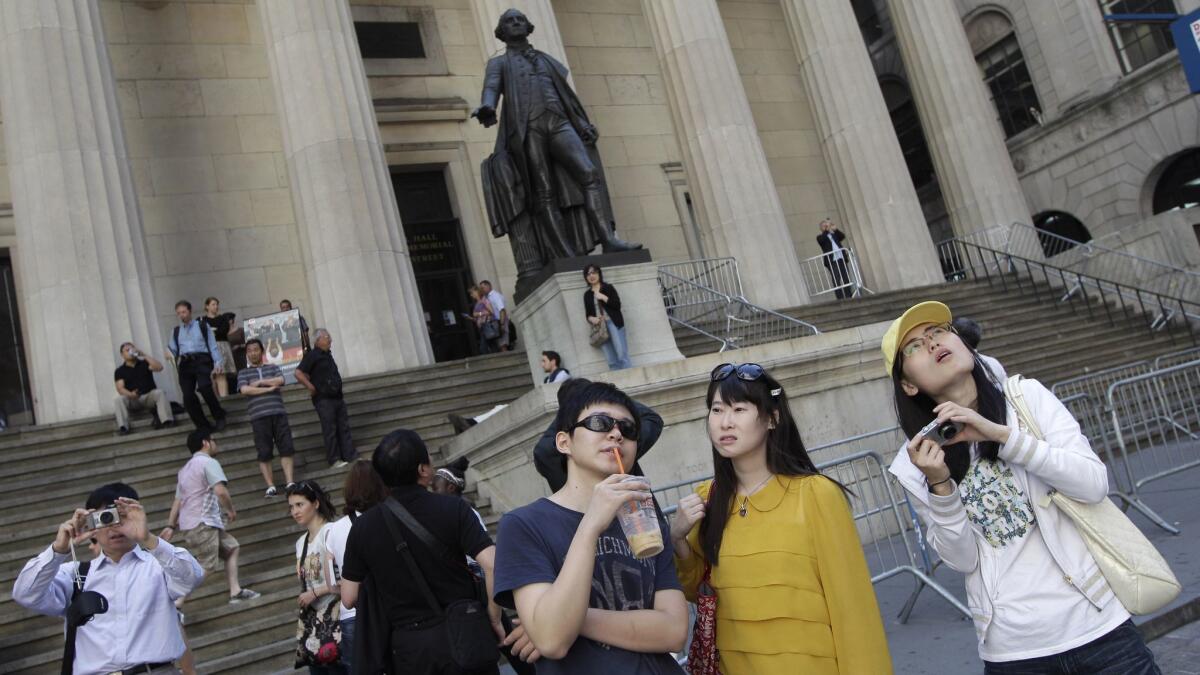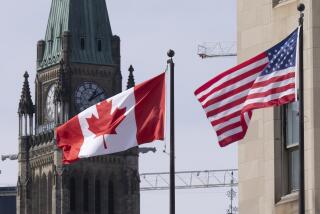China warns against U.S. travel, threatening luxury goods makers that rely on tourists

China issued a travel warning for the United States on Tuesday, saying Chinese visitors have been interrogated, interviewed and subjected to other forms of what it called harassment by U.S. law enforcement agencies.
The warning — the latest salvo in a trade battle that appears to be escalating by the day — threatens to further hurt some U.S. luxury goods makers, which depend on deep-pocketed foreigners for a not-insignificant part of their sales.
It urges Chinese citizens and Chinese-funded bodies in the U.S. to step up their safety awareness and preventative measures and respond “appropriately and actively.” It was issued by the foreign ministry, as well as the Chinese Embassy and consulates in the United States.
The warning comes amid an increasingly bitter trade dispute between Beijing and Washington and tougher immigration enforcement by the Trump administration.
China’s Ministry of Culture and Tourism issued its own travel alert for the U.S. on Tuesday, citing recent “frequent” shootings, robbery and theft, the official Xinhua News Agency said Tuesday. It didn’t provide any statistics or further details. Chinese students abroad were urged Monday to assess the risks involved given tightened visa restrictions.
The alerts are in effect until Dec. 31.
Asked if the move was part of the protracted trade dispute, Foreign Ministry spokesman Geng Shuang told reporters in Beijing it was a response to “current circumstances.”
Geng also said the United States had to be aware of the obstacles and effect it had created: “For some time, the U.S. has politicized normal China-U.S. educational exchanges using the China threat and Chinese infiltration as excuses,” he said at a daily briefing.
Tensions between the United States and China have deepened in recent weeks, after trade negotiations between the two nations fell apart in early May. The Trump administration has since blacklisted China’s crown jewel, Huawei Technologies Co., and is considering similar restrictions on more of the country’s tech firms. In response, China has threatened its own blacklist of “unreliable entities.”
Chinese social media has been abuzz with talk of U.S. visa and green card denials and other travel, education and employment woes under President Trump, who has sought to restrict the numbers of foreign visitors and others coming to the United States for what he claims are security and economic reasons.
Partly as a result, Chinese travel to the United States is falling after more than a decade of rapid growth, leaving cities, malls and other tourist spots scrambling to reverse the trend.
Three million Chinese tourists traveled to the United States last year, down from 3.2 million the previous year, according to the National Travel and Tourism Office, which collects data from U.S. customs forms. But Chinese citizens still spent more while stateside: $36.4 billion last year — up from $35.3 billion the year before — making them the biggest spenders of all international tourists.
The warning China issued Tuesday is its first such notice in at least the past decade, according to a search of state-run media. The foreign ministry advised travelers last October that U.S. customs enforcement officers had the right to check their belongings such as bags, electronic devices and autos without a search warrant. It also issued safety tips to Chinese tourists traveling to the remote U.S. territory of Saipan after a typhoon in November.
Tuesday’s advisory is likely to deepen the pressure already being felt by consumer and retail companies in the United States that have relied on big-spending Chinese tourists to prop up sales.
PVH Corp., the parent company of Tommy Hilfiger and Calvin Klein, plunged the most in a decade last week after trimming its revenue outlook. It blamed the escalating tariffs battle for causing anxiety for both American and Chinese shoppers.
American jeweler Tiffany & Co. said late last year that lower spending by tourists, particularly from China, to its flagship store in New York was a factor for its results missing analysts’ estimates. On Tuesday, it blamed lower tourist spending again for a shortfall in first-quarter sales.
Casinos and cruise lines would also feel pressure from the warning, as both industries have become increasingly reliant on wealthy Chinese tourists. China became the world’s biggest spender in international tourism in 2012 and its share has been growing ever since, according to data from the World Tourism Organization, a United Nations agency.
The Associated Press and Bloomberg were used in compiling this report.
More to Read
Sign up for Essential California
The most important California stories and recommendations in your inbox every morning.
You may occasionally receive promotional content from the Los Angeles Times.










